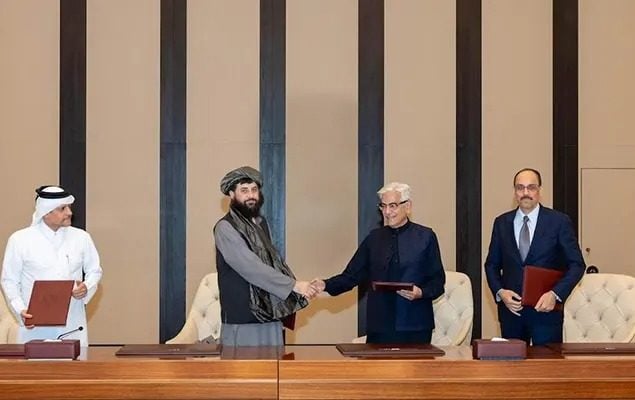

Pakistan and Afghanistan have agreed to extend a ceasefire for at least another week during talks in Turkiye, the Turkish Ministry of Foreign Affairs said.
Pakistan and Afghanistan have agreed to extend their fragile ceasefire for another week following intensive mediation talks in Türkiye, the Turkish Ministry of Foreign Affairs announced on Thursday.
The latest discussions, held in Ankara with Türkiye and Qatar serving as mediators, aimed to consolidate the truce initially reached earlier this month in Doha. Delegations from both countries are scheduled to meet again in Istanbul on November 6 to finalize the agreement’s terms and enforcement mechanisms.
In a joint statement released by the Turkish Foreign Ministry, both sides confirmed plans to establish a joint monitoring and verification mechanism designed to ensure compliance with the ceasefire and impose penalties for any violations.
Background: Weeks of Tension:
The ceasefire extension comes after a weeklong border conflict in early October that erupted following a series of explosions in Afghanistan — incidents Kabul blamed on Pakistan. The clashes quickly escalated into cross-border exchanges, with Islamabad claiming its forces killed more than 200 Afghan fighters, while Afghan officials reported the deaths of 58 Pakistani soldiers. The confrontation was the deadliest between the two nations since the Taliban’s return to power in 2021.
Negotiations in Türkiye:
For the past six days, crucial negotiations took place in Istanbul between delegations from Pakistan and the Afghan Taliban.
The talks centered on a single, longstanding demand from Islamabad that Afghan soil not be used for terrorism against Pakistan, and that the Taliban government take decisive action against India-backed militant groups, including the Tehreek-e-Taliban Pakistan (TTP), referred to as Fitna al-Khawarij, and the Balochistan Liberation Army (BLA), dubbed Fitna al-Hindustan.
According to diplomatic sources, the talks reached several tense deadlocks, and at one point, Pakistan’s delegation was reportedly preparing to withdraw.
However, at the urging of the host nations, Türkiye and Qatar, and following an appeal from the Afghan Taliban delegation, Islamabad agreed to continue negotiations in the interest of regional peace.
Key Outcomes of the Ankara Talks:
Both sides reaffirmed their commitment to maintaining the Doha ceasefire.
Pakistan’s continuation of the truce is conditional on Afghanistan’s commitment to prevent any terrorist activity from its territory against Pakistan.
The Taliban government agreed to take “clear, verifiable, and effective action” against militant factions including Fitna al-Khawarij (TTP) and Fitna al-Hindustan (BLA).
A joint monitoring and verification mechanism will oversee adherence to the ceasefire and impose sanctions on violators.
Mediators Türkiye and Qatar commended both delegations for their constructive engagement and vowed continued support for peace efforts.
Pakistani officials described their delegation’s approach as “principled and evidence-based,” calling the progress achieved “a victory for reason, prudence, and national interest.”
“This progress should be seen as a positive milestone not only for the people of Pakistan and Afghanistan but also for regional peace, stability, and global security,” the joint communiqué stated.






